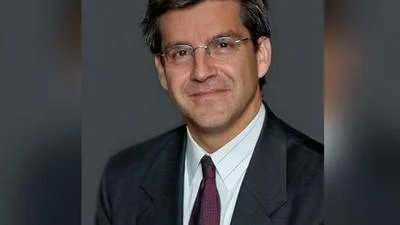Gov. Bruce Rauner
Gov. Bruce Rauner
The president of a Chicago-based legal group representing a public-sector employee in a case that could end forced unionism nationwide has demanded that Gov. Bruce Rauner stop overplaying his role in the case.
The group, the Liberty Justice Center (LJC) -- along with the National Right to Work Legal Defense Foundation -- is representing Mark Janus, the Illinois state employee who is challenging a state law that forces him to pay union dues as a condition of employment. Oral arguments before the U.S. Supreme Court in Janus v. American Federation of State, County, and Municipal Employee are scheduled for Feb. 26.
In a recent letter to Rauner, LJC President Patrick Hughes wrote:

Patrick Hughes, Liberty Justice Center president
“You have made the Janus case a centerpiece of your re-election campaign. In numerous interviews, you are falsely claiming involvement in the case and making predictions about its success – even though the justices of the Supreme Court have yet to hear oral arguments. You appear to have an immense misunderstanding of what’s really at stake in this case and what the implications would be. But perhaps most importantly, by touting this case in campaign-related events and interviews, you have recklessly politicized what’s at issue in Janus.”
In the case, the First Amendment rights of an estimated 5 million local and state public employees in 22 states, including Illinois, are on the line. These states require all public-sector employees to pay union dues even if they choose not to belong to a union. Workers’ rights advocates say the practice, which results in a portion of a worker’s dues backing political candidates who may not be of their choosing, is nothing more than forced unionism.
In his letter, Hughes cited multiple instances in which Rauner inserted himself in the case.
In one, a recent campaign appearance before the Chicago Tribune editorial board, Rauner was quoted as saying: “It’s in the courts, and we’re gonna win … we have a very high probability of winning the AFSCME lawsuit. From all indications, I believe it’s very likely.”
Hughes points out that the governor is not only not a party in the case but he is not participating in any way.
“Liberty Justice Center, as a 501(c)(3) organization, cannot and does not get involved in campaigns,” Hughes wrote. “Falsely claiming involvement in our activities, and linking the case to your re-election, could lead to false assumptions that our organization is involved in your re-election, which it is not.”
Hughes also pointed out that Rauner had every opportunity to play a role in the case; elected officials from Michigan, Alabama, Indiana, Arizona, Florida, Georgia, Nevada and other states submitted amicus briefs in support of the lawsuit. Rauner did not.
State laws requiring that all public-sector workers pay union dues stem from a 1977 U.S. Supreme Court decision Abood v. Detroit Board of Education.
Since then, the high court has ruled 7-2, 5-4, and, in 2016, 4-4 on challenges to the 1977 ruling. The 2016 deadlock let the law stand, but it would have almost certainly been overturned if Justice Antonin Scalia were on the bench at the time of the ruling. He heard oral arguments in the case but died a month before the final ruling in March of that year.
Many legal analysts predict that Justice Neil Gorsuch, President Donald Trump’s pick to replace Scalia, will be the deciding vote in allowing workers choice in paying union dues.






 Alerts Sign-up
Alerts Sign-up